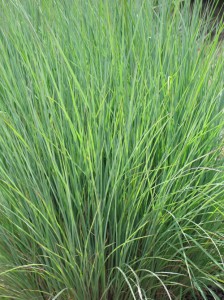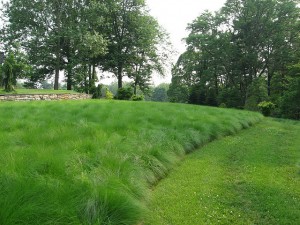By Rich Blankenship
With the reality of changing weather patterns and the continued desire for low maintenance landscaping, native plants are playing a more prominent role than ever before. Native grasses are certainly part of this mix and should be considered when designing your new landscape space.
 A few more commonly known species of native grasses include: Panicum virgatum (Switchgrass) a prairie grass that grows to 4’ and forms a dense clump; Schizachyrium scoparium (Little Bluestem) a medium stature grass growing to 2’ sporting bluish-green stems; Sporobolus heterolepsis (Prairie Dropseed) a low clump growing prairie grass with bright green airy seed heads. This is an excellent choice in place of Pennisetum ‘Hameln’ as it won’t seed into turf areas. All of these species lend themselves to inclusion in the perennial garden or as specimen plants standing on their own. As with all native species they are the best plants for tolerance of our clay soils and constantly changing weather patterns and are very easy to grow and care for. Low maintenance is one their best attributes as periodic watering and fertilizing keeps them in top form. Yearly shearing of the dead stems from winter is all that is needed to bring them to life. In general grasses are warm season plants bringing their beauty to the garden as the summer heats up. They are exceptionally nice when paired with asters for a late season display. Making a spot for at least a few of these native beauties is a must.
A few more commonly known species of native grasses include: Panicum virgatum (Switchgrass) a prairie grass that grows to 4’ and forms a dense clump; Schizachyrium scoparium (Little Bluestem) a medium stature grass growing to 2’ sporting bluish-green stems; Sporobolus heterolepsis (Prairie Dropseed) a low clump growing prairie grass with bright green airy seed heads. This is an excellent choice in place of Pennisetum ‘Hameln’ as it won’t seed into turf areas. All of these species lend themselves to inclusion in the perennial garden or as specimen plants standing on their own. As with all native species they are the best plants for tolerance of our clay soils and constantly changing weather patterns and are very easy to grow and care for. Low maintenance is one their best attributes as periodic watering and fertilizing keeps them in top form. Yearly shearing of the dead stems from winter is all that is needed to bring them to life. In general grasses are warm season plants bringing their beauty to the garden as the summer heats up. They are exceptionally nice when paired with asters for a late season display. Making a spot for at least a few of these native beauties is a must.

